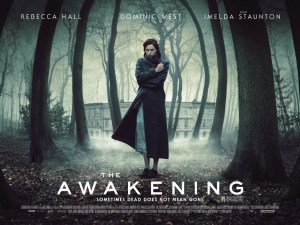 The old chestnut of the atheist spooked until forced into a change of mind visits us again, this time via the very British Awakening, a debut feature from a director whose experience thus far is solely in television. The results? Nick Murphy may be a name to note down.
The old chestnut of the atheist spooked until forced into a change of mind visits us again, this time via the very British Awakening, a debut feature from a director whose experience thus far is solely in television. The results? Nick Murphy may be a name to note down.
The establishment of our central character’s no-nonsense stance on ghostly encounters is introduced quickly, the film opening with a seance, into which Florence Cathcart (Rebecca Hall) bursts, to reveal the charlatanism at play. It’s a scene that doesn’t stand up to scrutiny — how does she know the seance is being carried out, indeed how is she able to march into a house not her own? — but it demonstrates her superiority complex. Others must realise that there is no such thing as an afterlife, let alone abilities to communicate with it, and Florence will make sure they do so; her views are correct, and she is saving them from their naivety. The second scene reveals the character’s atheistic self-absorption, a caller to her home assumed an autograph hunter. In fact Robert Mallory (Dominic West) is a teacher, seeking Florence’s scientific methods for investigating the possible presence of a ghost at a boarding school. Irritated at first, she is attracted to the case when a peculiarity is pointed out: a ghostly figure can be seen in the school’s annual group photograph, year on year, standing in the same position for each occurrence.
The original intention was to set the film in Victorian times, however this was moved to a post-WWI Britain, the reasoning that this was a period of great loss, families desperate to have not lost loved ones to the frontline. This setting lends itself well to the characterisation of Florence, highlighting the fact that The Awakening is not necessarily just a ghost story. Remove this element, and Florence is a woman who truly believes that she in fact does not, whereas her true reasoning for debunking seances and the like is that, deep down, she hopes to find a method of communication that works. For why? She regrets her bad treatment of her fiance, who she eventually lost to the war. It’s an interesting psychological nuance that adds depth to the film.
This, however, is a red herring. The true raison d’être to this story is slightly ludicrous, and all sewn up in a matter of minutes. Some threads throughout would have made this far less clumsy, however there are few; the matron (Imelda Staunton) is thrilled that Florence has come to the school, but this is tenuous. The constant presence of a schoolboy who stays on between terms, as his parents are abroad, is a more direct link, but this strand is another old chestnut, and detracts from the quality of storytelling; far too obvious and irksome for being so. As such, the climax is unrewarding.
That’s not to say The Awakening is not worthy a watch; it very much is. The cast is very good, Hall in particular suiting her character well, with a subtle performance. Staunton’s matron could easily have been over the top, especially in the high drama of the final scenes, however the actress gives us a convincing naturalness. But, best of all is some of the cinematography and symbolism on show. The children, intimidated at bedtime by the expectation of a ghost, appear almost apparitional themselves, simply by the use of white linen and long shadows cast over the beds from above, which link the boys together, thus demonstrating a collective fear, and that the ghost is likely one of them. Also, the use of lighting at points demonstrates Florence’s psychological journey. For instance, the character begins as defensive and close-minded. As her barriers begin to come down during an encounter with Robert, light, that at first does not penetrate, falls into the room and across her face, to highlight that Florence is ready for another man in her life. From this point on, she becomes more open to the idea of supernaturalism. This use of symbology is impressive for a first-time feature, and it works very well.
As such, The Awakening should be on your watch list. It’s not likely to stand up to repeat viewings, due to the aforementioned clumsiness of climax, but I’ve a feeling that we may be returning to reference this title in a few years from now.
The Awakening opens on 11 November

